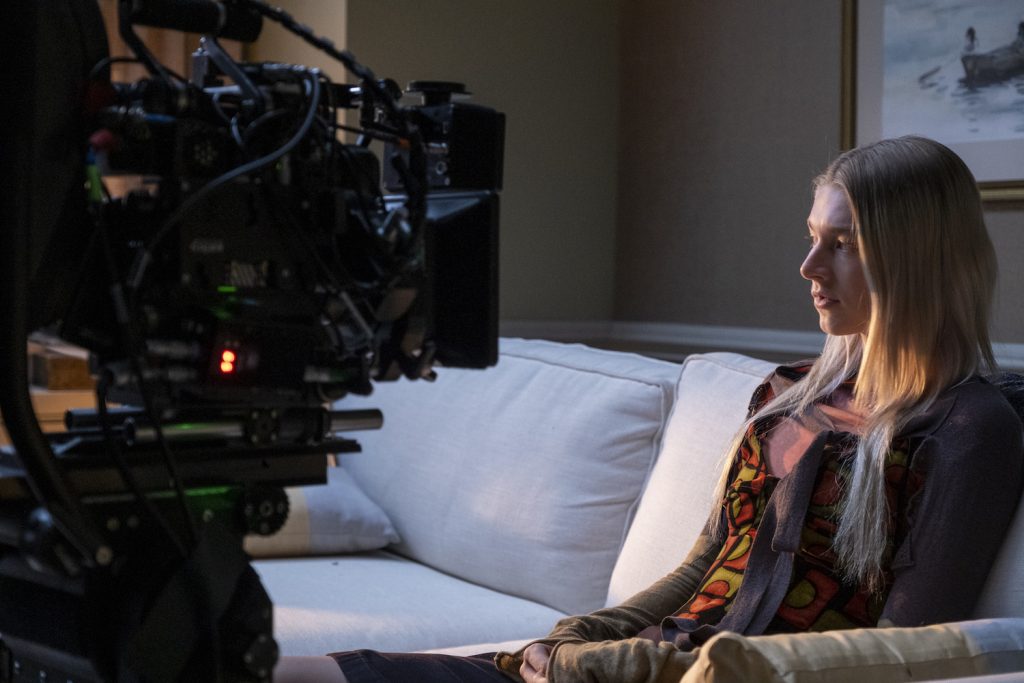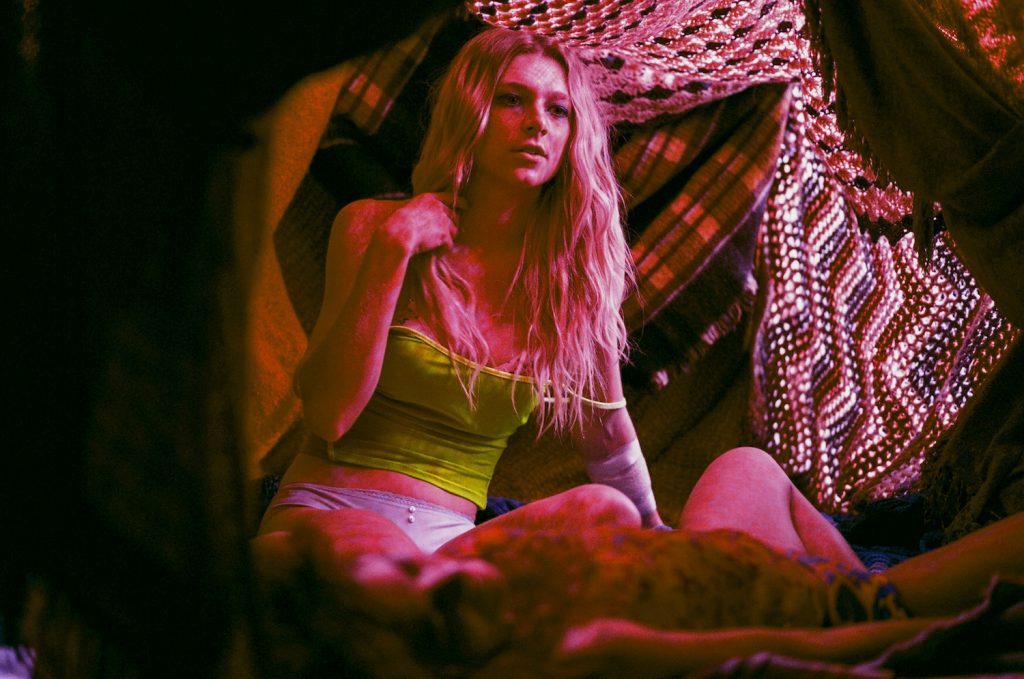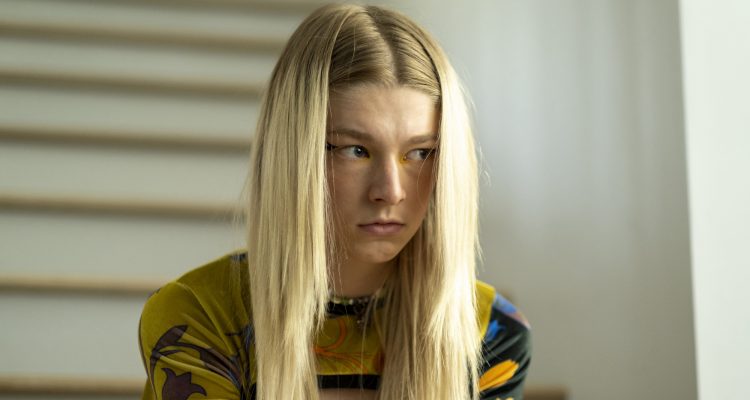With season one of HBO’s hit drama Euphoria, actress Hunter Schafer has catapulted into the Emmy conversation with her magnetic and nuanced performance as Jules.
Euphoria marks Schafer’s first acting experience, which is all the more impressive until you realize that for the Part 2 series special she took on the role of co-writer and executive producer.
In writing the special episode, particularly the insightful therapy session, Schafer was able to draw on her own experiences to achieve the character’s deep understanding of her own pitfalls and progress.
Schafer shared writing duties with Euphoria series creator, producer, director, and writer Sam Levinson. The series is an adaptation of an Israeli show of the same name, and follows the troubled life of 17-year-old Rue as she tries to stay clean after leaving rehab.
The first special episode captured Zendaya’s Rue meeting with her sponsor Ali (Colman Domingo) as she digested her best friend Jules’ sudden departure at the end of season one.
With the second special episode, Levinson and Schafer focused on Jules’ perspective, exploring her gender identity and the fallout from being catfished by the psychotic Nate (Jacob Elordi).
The fashion model and LGBTQ rights activist is heartbreakingly raw as Jules speaks with her therapist (Looking’s Lauren Weedman) and comes to terms with her relationship with Rue and Rue’s spiraling addiction.
Schafer chatted with Awards Focus about collaborating with Sam Levinson, the artistic fulfillment she gets from writing, her thoughts on Jules’ relationship with Nate’s online persona Tyler and what audiences can expect from the second season of Euphoria.
Awards Focus: You went from being directed by Euphoria creator Sam Levinson in the first season, to co-writing and executive producing together on the Jules special episode. How did your relationship with Sam evolve from the first season?
Hunter Schafer: A couple of things happened. Sam and I kept up between seasons one and two, and we had gotten into a rhythm of pretty constant, creative exchange of ideas, like songs that are inspiring us, or visuals and different artists. We share a lot of the same creative interests, which has been beautiful.
Between season one and the special episodes, I hadn’t realized that over the course of season one I had developed a dependence on acting. When we stopped filming and went into press I realized this became my go-to artistic expression, and now I have to wait how long before I could do this again?
That was a really strange sensation because I wasn’t expecting it. I was also brand new to acting. Sam taught me how to act from the ground up, so I can attribute a lot of that to Sam and it all channeled itself in the birth of this special episode.
AF: While Rue is loosely based on Sam Levinson’s own struggles with addiction, Jules was an original creation. Were you able to add input into Jules’ story in the first season?
Schafer: Sam put a lot of himself into Jules too, and she was a very beautifully fleshed out character when I first encountered her while I was auditioning, and yet it was automatically super collaborative from the get-go.
I remember the first thing we did after I got the role was sit down at a coffee shop, and (Sam and I) had a five-hour conversation about life and how our experiences paralleled with Jules. We figured out how weaving those experiences together work to form this fully formed character.

AF: Season two was delayed because of the pandemic, so what were the conversations around Jules episode and opening up the story for the second season?
Schafer: The Jules episode is interesting because it’s a massive reflection, and a readdressing, of a lot of what happened in season one through Jules’ eyes. That is what propelled us forward and gave us an idea of what season two would look like.
However, the only scene outside of the therapy session that happens in real time is the last scene where Rue and Jules see each other for the first time after their parting at the train station following the winter formal.
I love that scene so much because it’s so horribly awkward and vulnerable, and in a weird, sad way kind of hopeful because at least they’re not hostile towards each other. They can still be soft with each other and are in the moment. While it is short lived, and ultimately a depressing end to the episode, I think there is a tone of hope as far as them making amends.
AF: In Jules’ therapy session, she discusses the trans experience as being spiritual, and that she’s trying to find the person beneath the many layers she’s built upon herself. Were you able to draw on your own experiences when writing this episode, and did you speak with people within the trans community to help inform Jules’ story?
Schafer: Definitely! A medicalized transition is so specific and unique for each and every trans person that to generalize it for a character would have felt rather impossible. So the clearest decision to make was to draw upon my own experiences as far as my own personal ways of thinking about trans-ness.
I also had to do some backpedaling because Jules is 17 and I’m 22, and I’m further along in unearthing what it means to be trans than Jules is. She’s still young and she transitioned not that long ago, so she still has so much to learn about herself. It’s a combination of things that I still wrestle with today, and ideas that I was wrestling with when I was a younger trans person. This was also mixed in with Sam’s influence on Jules too. It was a mixture of everything.
AF: Was it cathartic for you to draw on those experiences, knowing how far you’ve come within your own identity?
Schafer: I can one hundred percent say that creating this episode from literally writing it over the phone with Sam, all the way though sketching out storyboards to watching the sets being built, to inhabiting the sets as the character, to sitting in editing and production and post-production, that it was the most cathartic, artistic experience I’ve ever had.
It was also because of how insanely intense that form of world-building is that I’ve never experienced anything like it before. It might have catalyzed something reminiscent of an addiction because I am going to be fiending for that sort of catharsis for the rest of my life.
There’s nothing like it. As someone who loves making art, I want to keep making art that gets me that same feeling.
AF: Are you still actively writing?
Schafer: I want to do a million things but writing was surprising. I don’t naturally feel like I take to words that well. I prefer imagery and other forms of storytelling, but it all goes hand in hand.
Filmmaking is sort of the culmination of all of that, that it feels visual and artistic enough, and in a multitude of ways, that I can approach it with a sense of optimism.
I’ve been writing on my own and thinking about more stories. There are so many narratives that don’t exist in mainstream media that I would die to see happen within my own lifetime. I am trying to make that part of my mission within my career to make those narratives that people can consume, because I think it’s pretty life changing to see people like you in love stories and other empowering narratives.

AF: How was it going into production for Euphoria season 2, and what was the reaction from the cast and crew toward your special episode?
Schafer: Everyone was so sweet, and I got to reunite with a lot of the crew for the special episode, which was really beautiful. Unfortunately, because the episode was so contained we couldn’t have the full cast there, but everyone was so sweet and supportive.
I love this cast and I feel really held by them. It’s like a family. So it felt like graduating high school or something and then coming home to your family and they’re like, ‘yeh! You did it!’
AF: Do you think that Jules ever fell for the real Nate behind his ‘Tyler’ persona, particularly because of the length of time they were speaking?
Schafer: It’s a complicated question because I can only speak from Jules’ perspective. I think it’s a little murky even for Sam who writes all the characters, and Jacob (Elordi) who plays Nate, about what Nate’s intentions were in catfishing Jules.
It was important to represent Tyler, or shyguy118, as this guy who sort of resembled Nate. He represented a possibility, or a fantasy, of a guy that she knows in real life that she could never really trust or be understood by. The fantasy is that he could do the things she wants them to.
I think that’s why it had to be someone that resembled Nate’s physicality. Ultimately, Tyler wasn’t Nate because we had to represent her idea of who it was versus who it actually was, which we did with a two-second take of Nate in the Jules’ special episode. It’s definitely complicated, but also a good question for Sam.
AF: What are you looking forward to audiences seeing in the second season?
I’m excited to see how people react to how the show has evolved since season one, because I think everyone involved has grown a lot, and evolved as human beings. The show has grown whilst still remaining like Euphoria in its essence. It’s riding a new wave this season and I’m excited to see how people will react to that.


